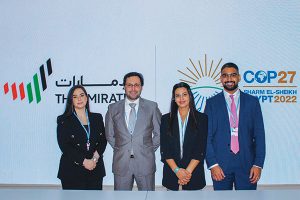DUBAI / WAM
Highlighting the importance of integrating education and climate to achieve global
education transformation, Dubai Cares, a civil society organisation formally associated with the United Nations Department of Global Communications, participated at the 27th United Nations
Climate Change Conference (COP27).
Marking the 30th anniversary of the adoption of the United Nations Framework Convention on Climate Change, COP27 began on November 16 and concludes on 18, at Sharm El Sheikh in Egypt, to ensure the full implementation of the Paris Agreement adopted by 196 parties at COP21 in 2015, to limit global warming to well below 2° Celsius, compared to pre-industrial levels.
Dubai Cares’ participation in the event centred on its ongoing efforts to highlight the powerful connection between climate action and education that reflects the interconnectedness of all Sustainable Development Goals.
The UAE-based global philanthropic organisation’s narrative at COP27 was built on the recommendations of its Framework for Global Education Transformation and the Rewiring Education for People and Planet report that call for a whole-of-society ecosystem approach built on cross-sectoral collaboration as crucial to leveraging education for the achievement of all SDGs.
One of the report’s six win-win solutions, in particular, addresses climate change by asking stakeholders to adapt education systems to build climate resilience and develop green skills.
Dubai Cares participated in several sessions and meetings at the event, engaging with high-level officials on ways to encourage governments around the world to integrate climate education in their national agendas, while equipping youth with green skills and involving them in decision-making by creating green job opportunities that allow them to contribute to greener economies.
Dr Tariq Al Gurg, Chief Executive Officer and Vice-Chairman of Dubai Cares, participated in the Inaugural Meeting on Greening Education Partnership in Sharm El Sheikh, initially launched at the Transforming Education Summit in September 2022 at the 77th UN General Assembly. During the meeting, Dr. Al Gurg, along with other senior officials, including Stefania Giannini, Assistant Director-General for Education at Unesco, Baroness Barran MBE, Parliamentary Under Secretary of State Minister for the School and College System in the United Kingdom, as well as other key donors and UN entities discussed how stakeholders can support the partnership based on the ongoing programmes and initiatives on climate change education, and what additional action needs to be planned.
“We must prioritise integrating climate change in our education systems globally because we cannot tackle health, food insecurity, poverty, gender inequality and other critical issues without climate. We also cannot address climate issues without involving education. Our current education systems cannot prepare our children and youth for climate action as it largely operates in isolation from other sectors. A whole-of-society ecosystem approach powered by cross-sectoral collaboration is the answer to transforming and rewiring our education systems in a way that integrates climate in curricula and leverages the potential of our children and youth for real climate action,†Dr. Al Gurg said during the session.
He also delivered a keynote speech at a COP27 side event hosted by the Future Economy Forum and Climate Governance Commission, in partnership with Dubai Cares, Global Partnership for Education, UNESCO, Schools 2030, Generation Unlimited, Aga Khan Foundation, The Rockefeller Foundation and the LEGO Foundation. At the session titled “Unleashing the Power of Education for the Future of the Planet: What’s Our Investment Case Moving Forward?â€, Dr. Al Gurg spoke about the importance of building a community between climate and education for COP28.
He noted that we could not expect our future humans to be committed to climate solutions unless they feel a sense of personal connection and empowerment with the issue and how their daily actions and behaviour impact their only home.
He added that this is only possible through an education ecosystem that places climate-related values, skills, knowledge and experiences at the centre of teaching and learning.
Dr. Al Gurg also joined a panel discussion on “Creating a Sustainable Future through Education: Setting the Road Map for Action and Impactâ€, hosted by the UK Department for Education together with the Foreign, Commonwealth and Development Office (FCDO).
As part of his intervention, Dr. Al Gurg noted that coordination at the highest levels is required to ensure that climate education is among the top priorities at global events. There is a need to involve all stakeholders and take into account the perspectives of different voices to amplify the urgency of the climate crisis.
According to 2021 Unesco data from 100 countries, 47 percent of national curriculum frameworks did not refer to climate change, with less than 40 percent of teachers feeling confident in teaching it and only one-third being capable of explaining well the effects of climate change on their region or locality to their students.
 The Gulf Time Newspaper One of the finest business newspapers in the UAE brought to you by our professional writers and editors.
The Gulf Time Newspaper One of the finest business newspapers in the UAE brought to you by our professional writers and editors.
